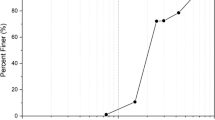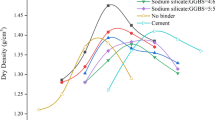Abstract
Although amounts of steel slag are left as waste, advances in treatment technologies have made steel slag a potential low-carbon supplementary cementitious material. Replacing cement with steel slag will drastically reduce carbon footprint, especially, in the engineering field where there are efforts to improve the geological properties of soft soil using cement-based cementitious materials. However, the influence of the degree of fineness, precarbonation treatment, and substitution ratio of steel slag on the mechanical properties of stabilized soils with a cement-steel slag blend and the corresponding influence mechanism are still unclear. Herein, four types of steel slag powders (i.e., coarse steel slag (CSS), fine steel slag (FSS), fine steel slag under precarbonation treatment for 2 h (FSS-C-2h), and fine steel slag under precarbonation treatment for 18 h (FSS-C-18h)) were prepared in a laboratory and used as a substitute to cement at ratios of 10%, 20%, 30%, and 50%. Tests were conducted to evaluate the strength and performance of the cement—steel slag blend stabilized soils (SCSs), and the changes in the phase and morphology of the hydration products were observed. The results showed that the SCS with 10% FSS-C-18h had the highest unconfined compressive strength after curing for 60 d at 110% of stabilized soil with pure cement. The SCSs with CSS and FSS showed no expansion failure during the continuous boiling test over 60 d. The main hydration products for the SCSs were C—S—H and ettringite. Concerning long-term strength and stability, FSS-C-18h at a substitution ratio of 10% or 20% is recommended for achieving green and low-carbon stabilized soils.
Similar content being viewed by others
Abbreviations
- Aft:
-
Ettringite
- CČ:
-
Calcite
- CH:
-
Portlandite
- CSS:
-
Coarse steel slag powder
- FSS:
-
Fine steel slag powder
- FSS-C-2h:
-
Fine steel slag under precarbonation treatment for 2 h
- FSS-C-18h:
-
Fine steel slag under precarbonation treatment for 18 h
- S-C:
-
Stabilized soils using pure cement
- S-CSS:
-
Stabilized soils using a cement-CSS blend
- SCSs:
-
Stabilized soils using a cement-steel slag blend
- S-FSS:
-
Stabilized soils using a cement-FSS blend
- S-FSS-C-2h:
-
Stabilized soils using a cement-FSS-C-2h blend
- S-FSS-C-18h:
-
Stabilized soils using a cement-FSS-C-18h blend
- S t :
-
Boiling expansion rate
- UCS:
-
Unconfined compression strength
References
ASTM D2487 (2017) Standard practice for classification of soils for engineering purposes. ASTM D2487, ASTM International, West Conshohocken, PA, USA
ASTM D4219–08 (2008) Standard test method for unconfined compressive strength index of chemical-grouted soils. ASTM International, West Conshohocken, PA, USA
ASTM D422–63 (2007) Standard test method for particle-size analysis of soils. ASTM D422–63, ASTM International, West Conshohocken, PA, USA
ASTM D4318-17e1 (2017) Standard test methods for liquid limit, plastic limit, and plasticity index of soils. ASTM D4318-17e1, ASTM International, West Conshohocken, PA, USA
ASTM D4972–19 (2019) Standard test methods for pH of soils. ASTM D4972-19, ASTM International, West Conshohocken, PA, USA
Chang EE, Chen TL, Pan SY, Chen YH, Chiang PC (2013) Kinetic modeling on CO2 capture using basic oxygen furnace slag coupled with cold-rolling wastewater in a rotating packed bed. Journal of Hazardous Materials 260:937–946, DOI: https://doi.org/10.1016/j.jhazmat.2013.06.052
Chang J, Wang D, Fang Y (2018) Effects of mineralogical changes in BOFS during carbonation on pH and Ca and Si leaching. Construction and Building Materials 192:584–592, DOI: https://doi.org/10.1016/j.conbuildmat.2018.10.057
Cui CY, Meng K, Xu CS, Liang ZM, Li HJ, Pei HF (2021) Analytical solution for longitudinal vibration of a floating pile in saturated porous media based on a fictitious saturated soil pile model. Computers and Geotechnics 131:103942, DOI: https://doi.org/10.1016/j.compgeo.2020.103942
Diaz-Loya I, Juenger M, Seraj S, Minkara R (2017) Extending supplementary cementitious material resources: Reclaimed and remediated fly ash and natural pozzolans. Cement and Concrete Composites 101:44–51, DOI: https://doi.org/10.1016/j.cemconcomp.2017.06.011
Dor M, Levi-Kalisman Y, Day-Stirrat RJ, Mishael Y, Emmanuel S (2020) Assembly of clay mineral platelets, tactoids, and aggregates: Effect of mineral structure and solution salinity. Journal of Colloid and Interface Science 566(15):163–170, DOI: https://doi.org/10.1016/j.jcis.2020.01.084
GB/T24175-2009 (2009) Test method for stability of steel slag. General Administration of quality supervision, inspection and Quarantine of the people’s Republic of China, Beijing, China
Ghadir P, Ranjbar N (2018) Clayey soil stabilization using geopolymer and Portland cement. Construction and Building Materials 188:361–371, DOI: https://doi.org/10.1016/j.conbuildmat.2018.07.207
Hou J, Liu Q, Liu J, Wu Q (2018) Material properties of steel slag-cement binding materials prepared by precarbonated steel slag. Journal of Materials in Civil Engineering 30(9):04018208, DOI: https://doi.org/10.1061/(ASCE)MT.1943-5533.0002370
Hu S, He Y, Lu L, Ding Q (2006) Effect of fine steel slag powder on the early hydration process of Portland cement. Journal of Wuhan University of Technology-Mater. Sci. Ed. 21(1):147–149, DOI: https://doi.org/10.1007/BF02861494
Ismail MA, Joer HA, Sim WH, Randolph MF (2002) Effect of cement type on shear behavior of cemented calcareous soil. Journal of Geotechnical and Geoenvironmental Engineering 128(6):520–529, DOI: https://doi.org/10.1061/(ASCE)1090-0241(2002)128:6(520)
JC/T603–1995 (2004) Standard test method for drying shinkage of mortar. JC/T603-2004, National Development and Reform Commission of the people’s Republic of China, Beijing, China (in Chinese)
Kourounis S, Tsivilis S, Tsakiridis PE, Papadimitriou GD, Tsibouki Z (2007) Properties and hydration of blended cements with steelmaking slag. Cement and Concrete Research 37(6):815–822, DOI: https://doi.org/10.1016/j.cemconres.2007.03.008
Lang L, Song C, Xue L, Chen B (2020) Effectiveness of waste steel slag powder on the strength development and associated micro-mechanisms of cement-stabilized dredged sludge. Construction and Building Materials 240:117975, DOI: https://doi.org/10.1016/j.conbuildmat.2019.117975
Li W, Qin J, Yi Y (2021) Carbonating MgO for treatment of manganese- and cadmium-contaminated soils. Chemosphere 263(9):128311, DOI: https://doi.org/10.1016/j.chemosphere.2020.128311
Li J, Zhang W, Li C, Monteiro P (2019) Green concrete containing diatomaceous earth and limestone: Workability, mechanical properties, and life-cycle assessment. Journal of Cleaner Production 223:662–679, DOI: https://doi.org/10.1016/j.jclepro.2019.03.077
Lin H, Suleiman MT, Brown DG (2020) Investigation of pore-scale CaCO3 distributions and their effects on stiffness and permeability of sands treated by microbially induced carbonate precipitation (MICP). Soils and Foundations 60(4):944–961, DOI: https://doi.org/10.1016/j.sandf.2020.07.003
Liu SH, Li LH (2014) Influence of fineness on the cementitious properties of steel slag. Journal of Thermal Analysis and Calorimetry 117(2):629–634, DOI: https://doi.org/10.1007/s10973-014-3789-0
Lizarazo-Marriaga J, Claisse P, Ganjian E (2011) Effect of steel slag and portland cement in the rate of hydration and strength of blast furnace slag pastes. Journal of Materials in Civil Engineering 23(2):153–160, DOI: https://doi.org/10.1061/(ASCE)MT.1943-5533.0000149
Lun Y, Mingkai Z, Cai X (2008) Methods for improving volume stability of steel slag as fine aggregate. Journal of Wuhan University of Technology-Mater Sci. Ed. 23(5):737–742, DOI: https://doi.org/10.1007/s11595-007-5737-3
Ma J, Yu Z, Ni C, Shi H, Shen X (2019) Effects of limestone powder on the hydration and microstructure development of calcium sulphoaluminate cement under long-term curing. Construction and Building Materials 199:688–695, DOI: https://doi.org/10.1016/j.conbuildmat.2018.12.054
Meng T, Qiang YJ, Hu A, Xu CT, Lin L (2017) Effect of compound nano-CaCO3 addition on strength development and microstructure of cement-stabilized soil in the marine environment. Construction and Building Materials 151:775–781, DOI: https://doi.org/10.1016/j.conbuildmat.2017.06.016
Miller CJ, Yesiller N, Yaldo K, Merayyan S (2002) Impact of soil type and compaction conditions on soil water characteristic. Journal of Geotechnical and Geoenvironmental Engineering 128(9):733–742, DOI: https://doi.org/10.1061/(ASCE)1090-0241(2002)128:9(733)
Nicolas MF, Vlasova M, Aguilar P, Kakazey M, Puig TP (2020) Development of an energy-saving technology for sintering of bricks from high-siliceous clay by the plastic molding method. Construction and Building Materials 242:118142, DOI: https://doi.org/10.1016/j.conbuildmat.2020.118142
Nielsen P, Boone M, Horckmans L, Snellings R, Quaghebeur M (2019) Accelerated carbonation of steel slag monoliths at low CO2 pressure-microstructure and strength development. Journal of Co2 Utilization 36:124–134, DOI: https://doi.org/10.1016/j.jcou.2019.10.022
Scrivener KL, John VM, Gartner EM (2018) Eco-efficient cements: Potential economically viable solutions for a low-CO2 cement-based materials industry. Cement and Concrete Research 114(114):2–26, DOI: https://doi.org/10.1016/j.cemconres.2018.03.015
Shi CJ (2005) Steel Slag—its production, processing, characteristics, and cementitious properties. Journal of Materials in Civil Engineering 36(3):230–236, DOI: https://doi.org/10.1061/(ASCE)0899-1561(2004)16:3(230)
Siddique S, Naqi A, Jang JG (2020) Influence of water to cement ratio on CO2 uptake capacity of belite-rich cement upon exposure to carbonation curing. Cement and Concrete Composites 111:103616, DOI: https://doi.org/10.1016/j.cemconcomp.2020.103616
Song Q, Guo MZ, Wang L, Ling TC (2021) Use of steel slag as sustainable construction materials: A review of accelerated carbonation treatment. Resources Conservation and Recycling 173:105740, DOI: https://doi.org/10.1016/j.resconrec.2021.105740
Suganya K, Sivapullaiah PV (2019) Compressibility of remoulded and cement-treated Kuttanad soil. Soils and Foundations 60(3):697–704, DOI: https://doi.org/10.1016/j.sandf.2019.07.006
Tossavainen M, Engstrom F, Yang, Menad N, Lidstrom Larsson M, Bjorkman B (2007) Characteristics of steel slag under different cooling conditions. Waste Management 27(10):1335–1344, DOI: https://doi.org/10.1016/j.wasman.2006.08.002
Verian KP, Behnood A (2018) Effects of deicers on the performance of concrete pavements containing air-cooled blast furnace slag and supplementary cementitious materials. Cement and Concrete Composites 90:27–41, DOI: https://doi.org/10.1016/j.cemconcomp.2018.03.009
Walker PJ (1995) Strength, durability and shrinkage characteristics of cement stabilised soil blocks. Cement and Concrete Research 17(4): 301–310, DOI: https://doi.org/10.1016/0958-9465(95)00019-9
Wang D, Chang J, Ansari WS (2019) The effects of carbonation and hydration on the mineralogy and microstructure of basic oxygen furnace slag products. Journal of Co2 Utilization 34:87–98, DOI: https://doi.org/10.1016/j.jcou.2019.06.001
Wang G, Wang Y, Gao Z (2010) Use of steel slag as a granular material: Volume expansion prediction and usability criteria. Journal of Hazardous Materials 184(1–3):555–560, DOI: https://doi.org/10.1016/j.jhazmat.2010.08.071
Wang Q, Wang D, Zhuang S (2017) The soundness of steel slag with different free CaO and MgO contents. Construction and Building Materials 151:138–146, DOI: https://doi.org/10.1016/j.conbuildmat.2017.06.077
Wu Y, Qiao X, Yu X, Yu J, Deng Y (2020a) Study on properties of expansive soil improved by steel slag powder and cement under freeze-thaw cycles. KSCE Journal of Civil Engineering 25(3):417–428, DOI: https://doi.org/10.1007/s12205-020-0341-6
Wu Y, Shi K, Han Y, Han T, Li D (2020b) Experimental study on strength characteristics of expansive soil improved by steel slag powder and cement under dry-wet cycles. Iranian Journal of Science and Technology 45(7):941–952, DOI: https://doi.org/10.1007/s40996-020-00473-y
Yildirim IZ, Prezzi M (2011) Chemical, mineralogical, and morphological properties of steel slag. Advances in Civil Engineering 2011:88–100, DOI: https://doi.org/10.1155/2011/463638
Yu CY, Cui CY, Wang Y, Zhao JY, Wu YJ (2021b) Strength performance and microstructural evolution of carbonated steel slag stabilized soils in the laboratory scale. Engineering Geology 295:106410, DOI: https://doi.org/10.1016/j.enggeo.2021.106410
Yu CY, Cui CY, Zhao JY, Zheng JJ (2021a) A novel approach to utilizing dredged materials at the laboratory scale. Construction and Building Materials 313:125568, DOI: https://doi.org/10.1016/j.conbuildmat.2021.125568
Acknowledgments
This study was financially supported by the National Natural Science Foundation of China (Grant No. 51878109, 51722801, 51578100), the National Key Research and Development Program of China (Grant No. 2021YFB2601100), and the Cultivation Program for the Excellent Doctoral Dissertation of Dalian Maritime University (Grant No. 0143210270).
Author information
Authors and Affiliations
Corresponding author
Rights and permissions
About this article
Cite this article
Cui, C., Yu, C., Zhao, J. et al. Steel Slag/Precarbonated Steel Slag as a Partial Substitute for Portland Cement: Effect on the Mechanical Properties and Microstructure of Stabilized Soils. KSCE J Civ Eng 26, 3803–3814 (2022). https://doi.org/10.1007/s12205-022-1762-1
Received:
Revised:
Accepted:
Published:
Issue Date:
DOI: https://doi.org/10.1007/s12205-022-1762-1




